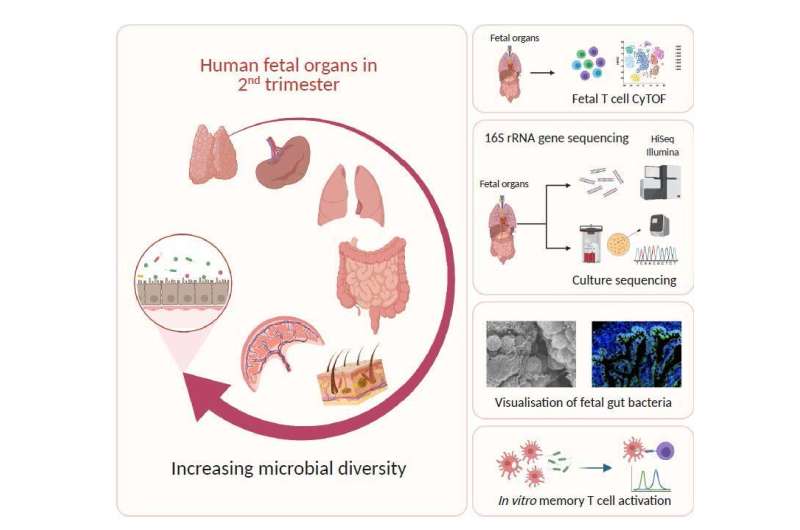Early encounter of microbes and the fetal immune system

The human fetal immune system begins to develop early during gestation, however, factors responsible for fetal immune-priming remain elusive. Using multiple complementary approaches, Dr. Florent Ginhoux from A*STAR's Singapore Immunology Network (SIgN), Professor Jerry Chan from KK Women's and Children's Hospital (KKH), Professor Salvatore Albani from the SingHealth Duke-NUS Translational Immunology Institute, and collaborators from Cambridge University explored potential exposure to microbial agents in-utero. The team identified live microbes across fetal organs that stimulate the activation of fetal T-cells during the second trimester of gestation. Their study published in the scientific journal, Cell, on 24 June 2021.
The team profiled microbes across fetal organs using 16S-rRNA gene sequencing and detected a low but consistent microbial signal in fetal gut, skin, placenta and lungs, during the second trimester of gestation. They identified several live bacterial strains including Staphylococcus and Lactobacillus in fetal tissues, which induced in vitro activation of memory T-cells in fetal mesenteric lymph-nodes, supporting the role of microbial exposure in fetal immune-priming. Finally, using scanning electron microscope (SEM) and Ribonucleic acid (RNA) in situ hybridisation (RNA-ISH), discrete localisation of bacteria-like structures and eubacterial-RNA were visualized within the 14th week fetal gut lumen. These findings indicate the selective presence of live microbes in fetal organs during the second trimester of gestation, and have broader implications on the establishment of immune competency and priming before birth.
The findings demonstrate that healthy human fetal tissues (in the second trimester of gestation) contain effector memory T-cells, a sparse biomass of bacteria and an active memory T-cell response towards fetal bacteria. They also demonstrates direct spatial localisation of bacterial entities, localized within the lumen of developing fetal gut, during second trimester of gestation.
Dr. Florent Ginhoux, Senior Principal Investigator, SIgN and co-last author of the study said that their "study demonstrates that such microbial presence primes the fetal immune system, thereby putting early microbial memory in the context of fetal immune priming, a concept not explored before in fetal immunity. It will be interesting to explore the precise nature of these microbial antigen-specific circulatory and immune cells that reside in human fetal organ tissues, and their potential role in imparting selective defense against pathogenic microbes in neonatal and adult life. Taken together, these findings have wider implications in understanding the key factors involved in fetal immune system development and priming in utero, which may set the basis for life-long human health and immunity of the organism."
More information: Archita Mishra et al, Microbial exposure during early human development primes fetal immune cells, Cell (2021). DOI: 10.1016/j.cell.2021.04.039
Journal information: Cell





















